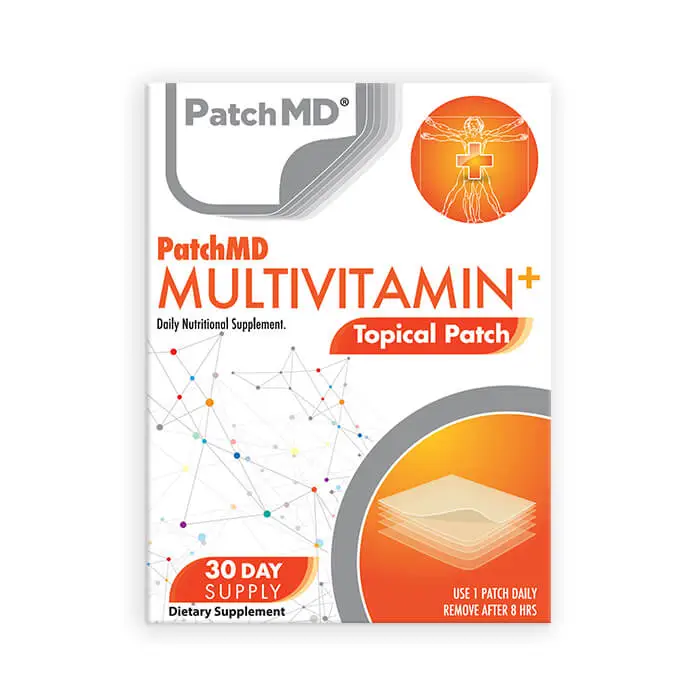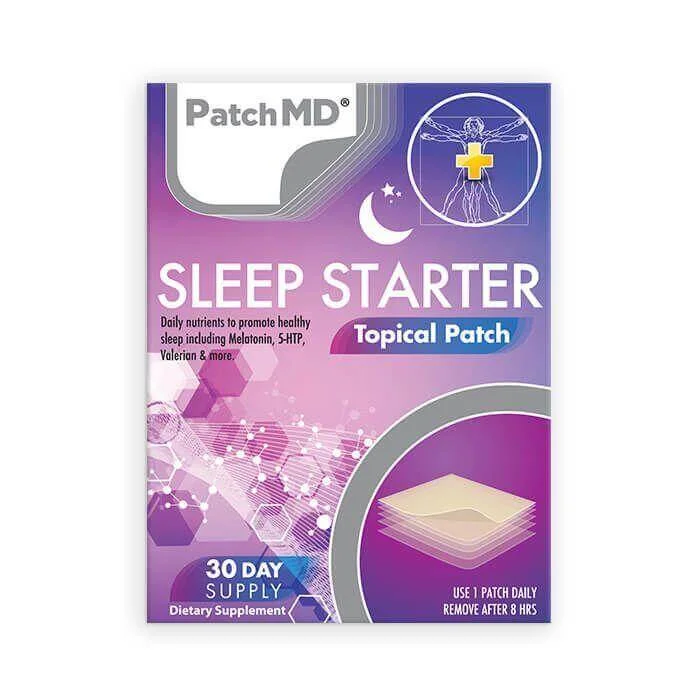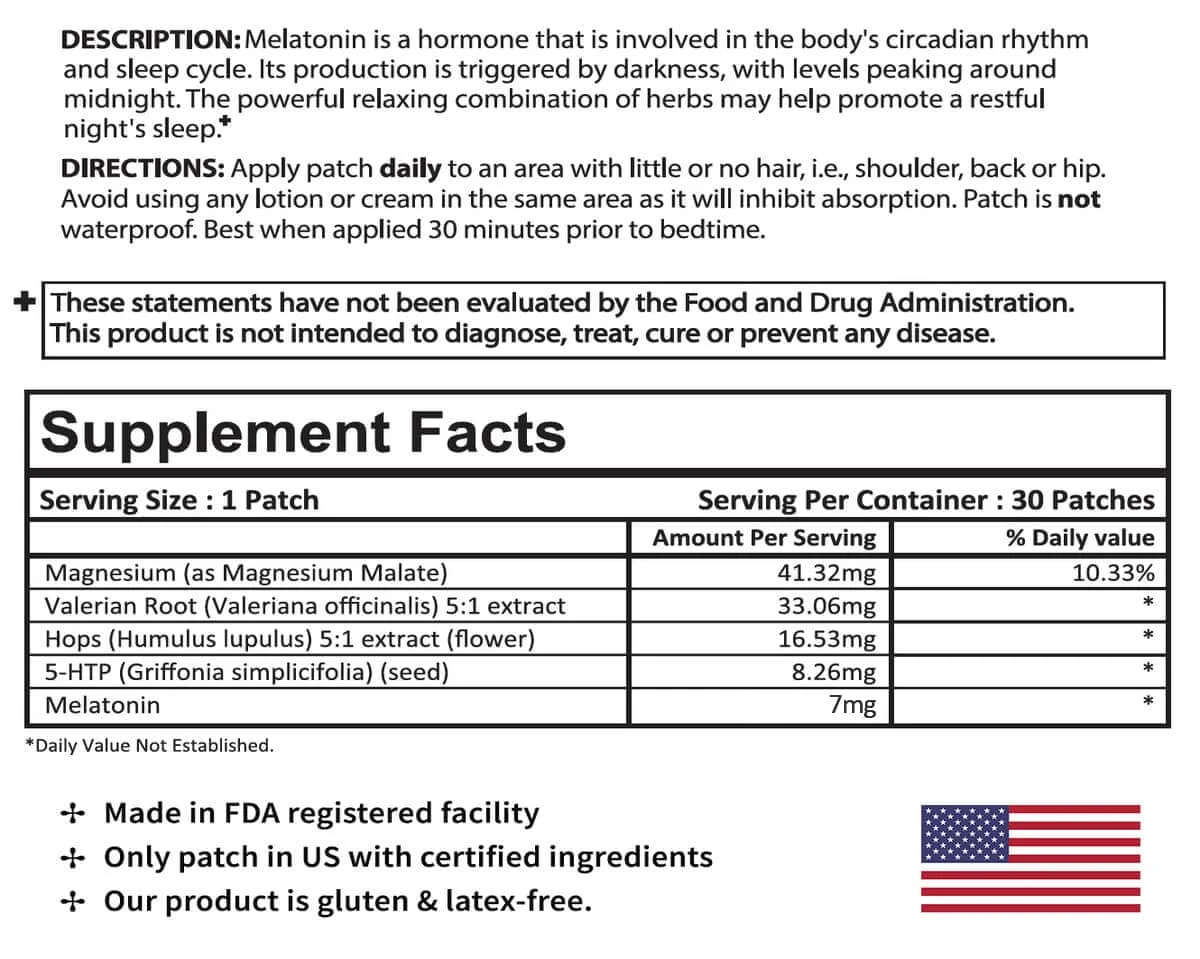- May help you fall asleep faster and more easily
- Combats insomnia with a natural solution
- Non-habit forming and drug-free
- Improves sleep quality so you wake up revitalized
- May diminish the symptoms of jet lag
Subscribe and Save 40% On Subscription Orders**
Sleep Starter Topical Patch (30-Day Supply)
$23.95 Original price was: $23.95.$19.95Current price is: $19.95. — or subscribe to save 40%
Availability: In Stock

Availability: In Stock
-
 Supports brain health & function
Supports brain health & function
-
 Non-stimulant
Non-stimulant
-
 Stimulate your brain health
Stimulate your brain health
-
 Powerful antioxidant
Powerful antioxidant
How do you take your vitamins?


As seen in







Description
Experience restful nights with the #1 Sleep Patches by PatchMD, harnessing the power of topical melatonin in their innovative sleepy patch.
Deeps Sleep PatchExperience restful nights with the #1 Sleep Patches by PatchMD, harnessing the power of topical melatonin in their Deep Sleep Patch.
PatchMD’s Sleep Patch with Topical Melatonin stands out as the #1 choice, offering the best sleep patches for adults, ensuring a restful night’s sleep.
Discover a restful night’s sleep with the #1 Sleep Patches by PatchMD, featuring topical melatonin; for more information, visit Magnesium for Anxiety: What You Need to Know.
PatchMD’s #1 Sleep Patches, infused with topical melatonin, are a game-changer for restful nights, even offering a safe and effective sleep patch for kids.
PatchMD’s Sleep Patch with Topical Melatonin is the #1 choice for sleep patches for adults, offering a convenient and effective way to improve sleep quality.
Experience the power of PatchMD’s Sleep Patch with topical melatonin and embrace the assurance of a definite good night’s sleep.
The Sleep Patch with Topical Melatonin by PatchMD offers an alternative to oral melatonin supplements, providing a convenient and innovative way to support better sleep.
Experience restful nights with the #1 Sleep Patches by PatchMD, utilizing innovative transdermal melatonin delivery for enhanced sleep support.
PatchMD’s Sleep Patch with topical melatonin, the #1 sleep patches, offers a convenient and effective alternative to traditional melatonin supplements for a restful night’s sleep.
What is the best Sleep Patch
Discover the top-rated sleep solution with the Sleep Patch with Topical Melatonin, proudly offered by PatchMD. If you’re wondering what the best sleep patch is, look no further. The Sleep Patch with Topical Melatonin is widely regarded as the premier choice among brands, delivering targeted and efficient melatonin absorption to help promote restful sleep and a rejuvenating sleep experience. Trust in the #1 topical patches by PatchMD for your ultimate sleep support. regular price melatonin patches cannot compete with our sale price or unit price when you break things down. The stickers regular relief bundle also known as the save bundle is promoting stickers whereas we provide a true bundle builder with a simple cart add for those who struggle with sleep disorders or sleep deprivation. Transdermal patches, Cancel anytime!
asleep
Experience the ultimate sleep solution tailored for seniors with the Sleep Patch with Topical Melatonin, proudly offered by PatchMD. When it comes to finding the best sleep patch for seniors, look no further. Our Sleep Patch with Topical Melatonin is specially formulated to cater to the unique sleep needs of seniors, providing targeted melatonin delivery to support a restful and rejuvenating sleep. Trust in the #1 Sleep Patches by PatchMD to deliver the best sleep patch for seniors, ensuring a peaceful night’s rest for a healthier and more energized tomorrow.
zpatch
Experience the undeniable efficacy of the Sleep Patch with Topical Melatonin, as it stands as the definitive answer to the question, “Does sleep patches work?” As the top patch provider, our scientifically formulated patches are meticulously designed to deliver optimal results, promoting a restful and rejuvenating sleep. With our proven track record and countless success stories, you can trust that our Sleep Patch with Topical Melatonin does work wonders in enhancing your sleep quality and promoting a refreshed awakening. Say goodbye to sleepless nights and discover the power of our products for yourself.
Shop & Save Today
Discover the unparalleled benefits of a restful night. Our innovative formulation combines the power of topical melatonin with the proven principles of homeopathy to deliver the definitive solution for a restful night’s sleep. With our Homeopathic formula, you can experience the harmonious blend of natural ingredients and cutting-edge technology, providing you with the ultimate support for deep, rejuvenating sleep. Say goodbye to sleep troubles and embrace the transformative effects of our transdermal patch technology today.
Featured ingredients
Experience the undeniable effectiveness of our #1 Sleep Patches by PatchMD, infused with topical melatonin, as they work harmoniously with your body’s natural sleep cycle to promote a restful night’s sleep. With our innovative technology, you can trust in their ability to deliver the melatonin you need, precisely when you need it, ensuring that our products work wonders for your sleep quality and overall well-being. Say goodbye to sleepless nights and embrace the assurance that our Topical Melatonin patches by PatchMD truly work.
sleep patch
Are you struggling to fall asleep at night even with the support of various sleeping aids? Melatonin sleep patches are the ideal type of sleep patch to help you fall asleep and experience healthy sleep. A melatonin sleep patch contains melatonin and is a sleep topical and natural sleep aid.
melatonin sleeping patches
You will find many sleeping aids across the melatonin supplement market but finding the right patch brand for your specific needs is important. The PatchMD melatonin patch is so easy, simply peel and apply the patch. Peel stick and go to bed. PatchMD is one the best amongst the patch brand industry.
melatonin patches for sleeping
For people who are sleep deprived the melatonin patch is made with natural ingredients and helps regulate circadian rhythms. The melatonin patch by PatchMD is the healthcare professional recommended patch brand. The PatchMD focus patch is another great product this patch brand offers.
sleep patch review
sleep patch strength
Also known as sleeping patches, sleeping patch, best sleep patch, restorative sleep, helping with irregular sleep patterns, fall asleep quicker.
The Original Sleep Patches
Our patented Sleep Patch promotes restful sleep, so you feel refreshed and revitalized each morning. Whether you need help to sleep due to shift work, jet lag, or insomnia, our sleep patches can help. They contain a high dose of melatonin along with other relaxing and naturally occurring nutrients which can help aid your natural sleep cycle. If you suffer from sleeping disorders or need help regulating sleep then our topical vitamin patches can be applied before bed and promote a restful sleep throughout the night.
- May help you fall asleep faster and more easily
- Combats insomnia with a natural solution
- Non-habit forming and drug-free
- Improves sleep quality so you wake up revitalized
- May diminish the symptoms of jet lag
- Effective absorption over pills and liquids
- Safe, easy, and convenient to use
Sleep Starter by PatchMD
A bad night’s sleep can leave you feeling like a zombie. Tiredness due to poor quality sleep can increase the risk of making mistakes, bad decisions, and even having accidents. Not to mention the fact that everything just feels 10x harder when we’ve not got the sleep we need. But our natural sleeping patch can help with naturally occurring sleeping aids and essential vitamins.
The Sleep Starter Topical Sleep Patch by PatchMD helps to promote a restful night’s sleep thanks to its dose of melatonin, along with magnesium bhb, valerian root, hops extract, and 5-HTP (Griffonia Simplicifolia).
Melatonin is a hormone that’s responsible for both initiating sleep and maintaining it throughout the night. When our sleep cycle is healthy, our bodies produce melatonin once it’s dark outside. As our levels of melatonin increase, our core body temperature decreases, and we start to feel less alert. We then feel more and more drowsy until the idea of sleep becomes appealing and we eventually nod off.
However, if our melatonin production is suppressed, then there’s nothing to trigger our usual sleep patterns. So, the end result is that we struggle to fall asleep or don’t sleep for very long.
This can be a consequence of the natural aging process, since melatonin production decreases as we get older. But it can also be caused by things like traveling to a different time zone, working night shifts, or using smartphones before bed. Melatonin is one of the most studied nutrients for sleep.
Our Sleep Patches have the Right Stuff
Using a melatonin sleep patch can be an effective way to give your body the rest it needs. It’s popular with people who travel frequently on business trips as it helps them avoid jet lag and perform at their best. It’s also ideal for people with age-related insomnia* who struggle to get to sleep and then stay asleep for the recommended 8 hours.
For people who work unusual shift patterns and need to sleep during the day, it can be the difference between a decent rest and no shut-eye at all. So, if you’re struggling to get the nightly rest you need and are fed up of feeling tired all the time, then melatonin sleep patches may be a practical solution.
Our sleep patch also contains several other ingredients that encourage good quality shut-eye; magnesium, valerian root, hops extract, and 5-HTP. When combined with melatonin, these compounds help to relax the body and prepare it for a night’s rest.
Magnesium is an essential mineral for everyday health but it can also aid the relaxation process. It activates the parasynthetic nervous system which helps your body to chill out. This system is the same one that’s activated by deep breathing and meditation. Magnesium regulates specific neurotransmitters that affect the brain and nervous system. It also helps to regulate melatonin so works in harmony with other patch ingredients to encourage restful sleep.
Valerian root is a herbal remedy for insomnia. It’s been prescribed for hundreds of years for a number of sleep disorders along with psychological anxiety.
The herb appears to work in a similar way to traditional sedatives by relaxing the brain so that you can switch off and sleep peacefully. Studies have shown that taking valerian root can help you fall asleep 15-20 minutes faster and improve the quality of your shut-eye too.
It’s even more effective when combined with hops which is why we pair them together in our patch formula.
Hops is another traditional remedy for people with sleep problems. It enhances the levels of GABA which reduces neuron activity in the brain so that you feel calmer and ready to relax. GABA also promotes more restful sleep as it increases the time spent in REM (the most restorative stage of sleep). Hops also appears to help lower the body temperature which is one of the signals that it’s time to sleep. This can encourage feelings of drowsiness so that you find it easier to drop off.
5-HTP is most well-known as an appetite suppressant but it can also help to support the natural sleep cycle too. It’s short for ‘5-Hydroxytryptophan’ which is naturally made from amino acids that we consume in protein. In our bodies, it is involved in serotonin production which plays an important part in regulating sleep patterns.
As a precursor to melatonin, it’s essential to ensuring that we start feeling tired once it gets dark. Having healthy levels of both serotonin and melatonin will help to ensure that you find it easy to both get to sleep and stay asleep. By combining both in our sleep patches, we ensure that your body has all the nutrients it needs for a peaceful night’s rest.
Our patches are also suitable for people with many different forms of allergies. They’re free from gluten, wheat, casein, milk, egg, tree nuts, peanuts, shellfish, soy, and corn. They don’t contain any GMOs, MSG, fillers, artificial dyes, colors, flavorings, or preservatives. So, you can be confident that you’re only receiving the nutrients you need and nothing else.
Each pack contains a 30-day supply of patches to help you get a good night’s rest whenever you need it. Our sleeping patch is made for overnight application so the melatonin an other sleeping aids are released over time as opposed to one bolus dose when taking orally. Order a pack today and experience the high-quality sleep benefits for yourself.
Sleep Starter Topical Sleeping Patch Directions
Apply patch daily to an area with little or no hair, such as the shoulder, back, or hip. Avoid using all lotions or cream in the same area as it will inhibit absorption. Patches are not waterproof.
PatchMD products are Latex, Lactose., Gluten and Sugar-free
ALL PATCH ORDERS INCLUDE 30 PATCHES (30-DAY SUPPLY) and 100% Moneyback Guarantee
* Speak to a licensed healthcare professional if your insomnia symptoms persist or are not age-related.
* These statements have not been evaluated by the Food and Drug Administration. This product is not intended to diagnose, treat, cure or prevent any disease.
melatonin patches
If you have sleep apnea, restless leg syndrome or trouble sleeping, have you considered transdermal melatonin? There are different types of melatonin such as oral melatonin supplements that promotes sleep. You can take oral supplements or patches sleeping. The melatonin patch delivers melatonin over the course of the day. Experience the effectiveness of melatonin.
patches with melatonin
When it comes to sleep health, melatonin levels are key. Transdermal melatonin delivery works with each stage of sleep, helping regulate circadian rhythms so you get intp deep rem sleep. When applying the patch, simply peel and place on your skin. The PatchMD sleep patch contains transdermal melatonin. This is a slow delivery to improve sleep. Unlike oral melatonin supplements, patches sleeping, like the klova sleep patch.
sleep medicine
The drug administration fda and the national library of medicine has approved transdermal melatonin and has started providing access to the public. To release melatonin, there needs to be black pepper. PatchMD patches compare to other patches and they make patches safe. There are also sleep medicines that have been tested in sleep studies.
best melatonin patches
plasma melatonin
melo
51 reviews for Sleep Starter Topical Patch (30-Day Supply)
You must be logged in to post a review.
Sleep Starter / Supplement Facts / Ingredients

You may also like…
-
Sale!Sale!
 as low as $11.97 $23.95
as low as $11.97 $23.95Anti Aging Topical Patch (30-Day Supply)
22 Review(s)
$23.95Original price was: $23.95.$19.95Current price is: $19.95. — or subscribe to save 40%
22 Reviews -
Sale!Sale!
 as low as $11.97 $23.95
as low as $11.97 $23.95B12 Energy Plus Patch (30-Day Supply)
140 Review(s)
$23.95Original price was: $23.95.$19.95Current price is: $19.95. — or subscribe to save 40%
140 Reviews -
Sale!Sale!
 as low as $11.97 $23.95
as low as $11.97 $23.95Happy Hour (Formerly Hangover Patch)
13 Review(s)
$23.95Original price was: $23.95.$19.95Current price is: $19.95. — or subscribe to save 40%
13 Reviews
Related products
-
Sale!Sale!
 as low as $35.91 $66.50
as low as $35.91 $66.50Iron 3 month supply
1 Review(s)
$66.50Original price was: $66.50.$59.85Current price is: $59.85. — or subscribe to save 40% -
Sale!Sale!
 as low as $23.37 $44.39
as low as $23.37 $44.39Menopause Day Topical Patch (30-Day Supply) 2 Pack
2 Review(s)
$44.39Original price was: $44.39.$38.95Current price is: $38.95. — or subscribe to save 40%
2 Reviews -
Sale!Sale!
 as low as $23.97 $44.39
as low as $23.97 $44.39Menopause Relief
$44.39Original price was: $44.39.$39.95Current price is: $39.95. — or subscribe to save 40% -
Sale!Sale!
 as low as $23.97 $44.39
as low as $23.97 $44.39PMS Relief
2 Review(s)
$44.39Original price was: $44.39.$39.95Current price is: $39.95. — or subscribe to save 40%
2 Reviews
-
Sale!Sale!
 as low as $11.97 $23.95
as low as $11.97 $23.95Multivitamin Patch
594 Review(s)
$23.95Original price was: $23.95.$19.95Current price is: $19.95. — or subscribe to save 40%
594 Reviews -
Sale!Sale!
 as low as $11.97 $23.95
as low as $11.97 $23.95B12 Energy Plus Patch (30-Day Supply)
140 Review(s)
$23.95Original price was: $23.95.$19.95Current price is: $19.95. — or subscribe to save 40%
140 Reviews -
Sale!Sale!
 as low as $11.97 $23.95
as low as $11.97 $23.95Iron Plus Topical Patch (Iron Patches for Anemia)
124 Review(s)
$23.95Original price was: $23.95.$19.95Current price is: $19.95. — or subscribe to save 40%
124 Reviews -
Sale!Sale!
 as low as $11.97 $23.95
as low as $11.97 $23.95T-Synergy Thyroid Support (30 day supply)
1 Review(s)
$23.95Original price was: $23.95.$19.95Current price is: $19.95. — or subscribe to save 40%













Marie –
My husband and I both use these sleep patches. Just one per night has helped us both. The material is comfortable, and the adhesive doesn’t bother my skin. These aren’t waterproof, but that hasn’t been an issue for us, since we put the patch on right before bed.We’ve tried several brands, but these are our favorite so far.
Lee Lee –
Love how rested I feel in the morning
Darlene –
Very easy to use and they stay on really well.
Claribel –
Thanks for finally writing about > Sleep Patch with
Topical Melatonin | #1 Sleep Patches by PatchMD
Dana Ferrullo –
They just upgraded the packaging, so the stickers are way easier to get off their backing. They stay on all night long. I have the most sensitive skin of anyone I’ve ever met, and they do not irritate my skin. I get a great nights sleep with minimal grogginess in the morning. And within an hour of putting it on I feel sleepy.This patch is a lifesaver.
Karen Barney –
I think these work great I use them with sleep supplements and they work great together
Wayne –
I ran out and wife forgot to re-order with her other patches in time…. I found out the hard way that I don’t sleep much without them!
T. Crotts –
These work great! I have tried Klova (too sticky, left red marks) and Aqualief (not sticky enough, fell off overnight) brands. These work better than both of those. Helps me fall asleep quickly and stay asleep all night
christine l marino –
Not sure if this is working or I just want it to work. Package was short by one sheet (6) days. I contacted the manufacture and they answered my email with we are having high volume of correspondence and will get back to you>>>>>> Well they haven’t>>>>>>>
Susan Morrison –
Easy to apply works well helps promote healthy sleep.
Hachik O. Manukian –
I would recommend this to a friend.
Rhonda McEllhenney –
Easy to use but too small to really work well.
Dominick Cannatelli –
I have sleep Apnea and sleep with a CPAP unit. The patches did not work for me but I have a very unstable sleep problem so I may not be a good subject for these patches.
Dee –
This did work for me and the tape left a rash on my arm.
C & H –
Great patch made with natural products to help you with sleep. I put the patch on about 30 mins before bedtime, and shortly thereafter, I’m yawning and my eyes are having difficulty staying open and I’m sliding down under the covers!I’m relaxed , out sleeping for about 7- 8 hrs! So nice.
Amazon Customer –
This product really worksI Fall asleep easily and feel no drug hangover in the amI am a horrible sleeperThis is a godsend
e-lectra –
I like patches because of their continuous release. I take one prescription and several supplements for sleep. This patch plus a CBD supplement do a good job of tying my sleep cycle together.
Jerry F. Smith –
This item was perched for someone else
Terrie Mehdiratta –
Great product. Does not make you groggy the next day.
Sharon Fink –
Better than Klova Sleep! I have used these sleep starter patches for years. I admit that I had shiny object syndrome when I saw another brand the klova sleep patch. I didn’t like paying more for the patches, however a good nights rest is the most important thing to me when you have a five year old and a nine year old running around you all day. I like getting the 4 weeks supply because I only have to use them once or twice a week so one pack really lasts me about 6 months. I just peel, stick and sleep thanks to PatchMD!
Rebecca –
Sleep usually within 30-60 minutes! These were the very first patches I bought. I was very skeptical at first. I’m an extreme insomniac 4 years with ADD. I must confess for me who says they can never fall asleep I have on many occasions. Nothing is perfect but these make me feel like I’m more of a normal person. A person that doesn’t have to take medication to sleep every single night of their life. For me I sleep about 5 hours with the patch. I’ve even tried to Patches but I still wake up 5 hours to 6 hours. I wonder if there’s a way to make them more time release so I can sleep longer. I just know that I am falling asleep and that is a miracle that a patch can do that without medication. I have gone on to buy other patch is now that are true Miracles. I used to focus during the day now. I don’t know how I’m going to live life without these patches! Thank you you have definitely changed my life for the better.